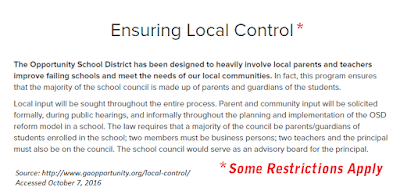Governor Deal and his surrogates have been misrepresenting the OSD as a tool to empower communities to improve their schools when, in fact, it wrests control from the community, concentrating power in an appointed OSD Superintendent, accountable only to the Governor.
While the authorizing legislation, SB 133, requires a public hearing on any school being considered for takeover, nothing in the law requires the OSD Superintendent to accede to the will of the community. It’s a hearing with no requirement of actually listening. In fact, SB133 is emphatic that the OSD Superintendent has “sole discretion” on the selection of the schools, and it is the OSD Superintendent who decides if a school is
- directly managed by the OSD,
- operated by the local board and the OSD (with the OSD Superintendent having “the authority to direct changes”),
- converted to a state charter, or
- closed.
There is no recourse for the community.
But surely the parents and community and parents have some input, right? After all, the proponents of the OSD promote “Local Control” on their website (funded by Governor Deal's shadow PAC Georgia Leads):
Aside from the grammatically-challenged opening sentence on their page, these takeover advocates contend that parents, teachers, and the community have a majority seat at the table--except when they don’t. Only schools in intervention models 1 and 2 above will have a school council, and even then “existing school councils may remain in place or may be reconstituted under the guidance of the opportunity school principal.” If the advice of the council is not to the liking of the appointed principal, then there is a mechanism to replace the council.
The “local control” narrative falls completely apart for the state’s preferred intervention model--state charter schools. Parents and the existing school council “shall be eligible for consideration” for the governing board of the new charter, but are not guaranteed a seat. The actual requirements for the governing board are that they come from the community and are US citizens, Georgia residents, and “must not be an employee of the opportunity school” (ciao, teachers!).
So where does the OSD Superintendent find his governing board candidates? I kid you not: by “soliciting and considering recommendations from the local legislative delegation,” who in Georgia might not even be residents of the school systems in which a school is being taken over.
Even then, the hand-picked governing board is permitted only to choose from allowed items on the State Charter Schools Commission menu. This same legislation provides that the State Charter Schools Commission “shall solicit, screen, and select” the consultants and management organizations that can partner with the governing boards to support and operate the OSD charter schools.
So to recap:
- The enabling legislation provides for community input with no “opportunity” to directly influence the operation of their schools.
- The “local school council” provisions are a farce. Existing councils can be changed at the principal’s discretion, and for the schools converted to charters there is no requirement or expectation that the governing board include any parents (OSD proponents' arguments to the contrary).
- The community has no recourse, even if it overwhelmingly disagrees with the direction chosen for their school. Authority is concentrated in the OSD Superintendent, answerable only to the Governor, and in the State Charter School Commission, operating out of the Governor’s Office of Student Achievement.
This increases community involvement? Shenanigans!

No comments:
Post a Comment